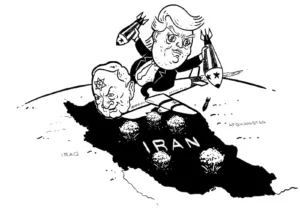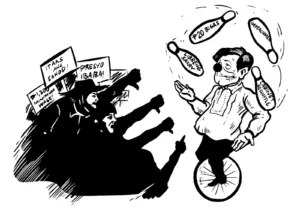If only the relatives of the victims of the fake war on drugs could, they would have confronted Rodrigo Duterte when he faced the congressional hearing. The families were seething with anger at his casual defense of the killings, insistence that all victims of the fake war were “criminals,” and gross lack of remorse for the lives he took. Even though they were not comfortable seeing him and being in the same room, they tolerated his presence to show him that they were willing to fight for justice in all arenas.
This was the second time Duterte faced a legislative hearing. On October 28, he used the Senate hearing as a platform to grandstand for hours without being contradicted. Along with his co-accused senators, he maligned those who exposed the brutality and corruption of the fake war on drugs. He tried to do the same in Congress on November 13. In the same hearing, he acknowledged “legal and moral responsibility” for the fake war on drugs. He admitted the existence of a death squad in Davao when he was still mayor, funding police operations, appointing an official to lead the group that allegedly implemented the “Davao model” of extrajudicial killings on a national scale, the killing of “6-7 people,” and many more. But when asked about specific cases, he had nothing to recall, no names, and no concern.
Duterte’s brazenness is an insult not only to the families of the victims and the congressmen he faced but also to the people. He twisted legal terms to deny personal responsibility. He even dared the International Criminal Court (ICC) to arrest him before he dies, but in the same breadth, strongly emphasized that the court has no authority in the country and does not recognize it. Despite this, there is no doubt that the killings under the fake war on drugs was a policy of his regime. All his statements in the Senate and Congress can be used by the ICC to hold him accountable for crimes against humanity, according to lawyers.
Lawyers, democratic groups, and human rights groups are calling on congressmen to investigate where the funds for the reward system of police and death squads that Duterte revealed came from. They emphasize the need to expose Duterte’s use of confidential and intelligence funds when he was still president. They also agree with a former senator’s proposal to open the bank accounts of the Duterte family to see the flow of bribes from Chinese drug lords to them.
In the long fight for justice, the families of the victims did not expect that there would come a time when it would be investigated in the Senate and Congress. But they ask, now that more and more people are asking questions, why is Ferdinand Marcos Jr silent and why is it taking so long for them to show support?
There is enough evidence to charge and prosecute Duterte, they say. This task should not be left to the families of the victims alone. They also emphasize the need to recognize the authority and investigation of the ICC, which is ready to issue an arrest warrant. The country should return to the ICC to speed up the process, they say.
The groups are urging Congress to investigate the hundreds of extrajudicial killings ordered by Duterte against unionists, activists, and human rights defenders. The police and officials involved in the drug war are also involved in these killings. In the upcoming hearings, the cases of the massacre of nine activists in Southern Tagalog, known as the “Bloody Sunday Massacre,” will be presented.
During the days of the hearings where Duterte was the main witness, democratic groups, including the families of the victims, held rallies to call for his imprisonment.











